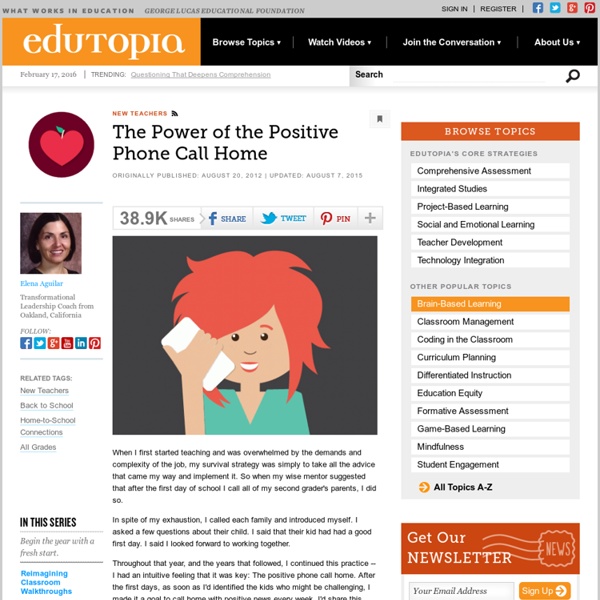The Power of the Positive Phone Call Home
When I first started teaching and was overwhelmed by the demands and complexity of the job, my survival strategy was simply to take all the advice that came my way and implement it. So when my wise mentor suggested that after the first day of school I call all of my second grader's parents, I did so. In spite of my exhaustion, I called each family and introduced myself. I asked a few questions about their child. I said that their kid had had a good first day. Throughout that year, and the years that followed, I continued this practice -- I had an intuitive feeling that it was key: The positive phone call home. When I taught middle school, this strategy made the difference between an unmanageable group of kids and an easy group. First I'd call parents of the kids who I knew would be challenging, those I suspected rarely got positive calls. Some of these kids were difficult, extremely difficult. I know how many hours teachers work.
Understanding School Refusal
Case Examples Rebecca, an eight-year-old girl , has always had difficulty attending school. Since she began third grade two months ago, her problems have significantly worsened. She constantly begs to stay home from school, having tantrums that cause delay in dressing and often result in her missing the bus. Nicholas is a fourteen-year-old boy who has missed forty-three days of school since beginning the eighth grade four months ago. Prevalence and defining characteristics As much as 28% of school aged children in America refuse school at some point during their education. 1 School refusal behavior is as common among boys as girls. Rebecca and Nicholas are just two examples of how school refusal manifests in youth. As evidenced by Rebecca and Nicholas, there are varying degrees of school refusal behavior. The cause and maintenance of school refusal behavior Rebecca had several physiological symptoms at school and went home to be with her mother and play. Treatment Table 1 Concluding remarks
The Extraordinary School Counselor
Comprehensive Guidance and Counseling eLearning Center
MCCE is part of the College of Education at UCM Home | Disclaimer | Legal Notice | Privacy Policy
Military Family Resources
Armed Forces Foundation Bob Woodruff Foundation Building Homes for Heroes Community and National Resources for Wounded, Ill, and Injured Advocacy Intrepid Fallen Heroes Fund Military HomefrontMilitary Interstate Children's Compact CommissionMilitary K-12 Pa Military OneSource Military Spouse Resource Center Navy-Marine Corps Relief Society Operation Family Fund Operation First Response Our Military Kids Pentagon Federal Credit Union Foundation USA 4 Military Families Veterans of Foreign WarsVoice for the Military ChildWounded, Ill and Injured Compensation and Benefits Handbook
Entirely Elementary...School Counseling
Resources
Online Resources SickKids WebsitesBrain DevelopmentSpeech & LanguageMental HealthLearning Disabilities & Attention Deficit DisordersRehabilitation Services & Interventional TherapiesDevelopmental DisabilitiesProfessional Standards and Practice of PsychologyActivities and Academic Help OnlineTips for Reading Comprehension SickKids websites top Brain Development BrainWonders - infant & toddler development - Zero to ThreeBrain Connection- Information on brain development and its impact on learning, thinking, feeling and behaviour - Brain Connection - Child Development Speech & Language Mental Health Learning Disabilities & Attention Deficit Disorders Learning Disabilities Online- A fabulous resource!! Rehabilitation Services & Interventional Therapies Developmental Disabilities Professional Standards and Practice of Psychology Activities and Academic Help Online Tips for Reading Comprehension– Resources for vocabulary and reading comprehension development
Excel Templates, Calendars, Calculators and Spreadsheets by Vertex42
EVIDENCE-BASED Practice | Social Work Policy Institute
Partnerships to Promote Evidence-Based Practice Evidence-based practice (EBP) is a process in which the practitioner combines well-researched interventions with clinical experience and ethics, and client preferences and culture to guide and inform the delivery of treatments and services. The practitioner, researcher and client must work together in order to identify what works, for whom and under what conditions. This approach ensures that the treatments and services, when used as intended, will have the most effective outcomes as demonstrated by the research. It will also ensure that programs with proven success will be more widely disseminated and will benefit a greater number of people. This Web resource was partially funded by a contract to IASWR from NIMH. Evidence-Based Practice Resources Evidence-Based Practice: Registries and Databases The Evaluation Center’s EBP Me Return to Top Online Resources and Research
CART: Compendium of Assessment and Research Tools
EVIDENCE-BASED Practice | Social Work Policy Institute
Partnerships to Promote Evidence-Based Practice Evidence-based practice (EBP) is a process in which the practitioner combines well-researched interventions with clinical experience and ethics, and client preferences and culture to guide and inform the delivery of treatments and services. The practitioner, researcher and client must work together in order to identify what works, for whom and under what conditions. This approach ensures that the treatments and services, when used as intended, will have the most effective outcomes as demonstrated by the research. This Web resource was partially funded by a contract to IASWR from NIMH. Evidence-Based Practice Resources Evidence-Based Practice: Registries and Databases California Evidence-Based Clearinghouse for Child Welfare (CEBC) CEBC provides child welfare professionals with easy access to vital information about selected child welfare related programs. Return to Top
Related:
Related:



